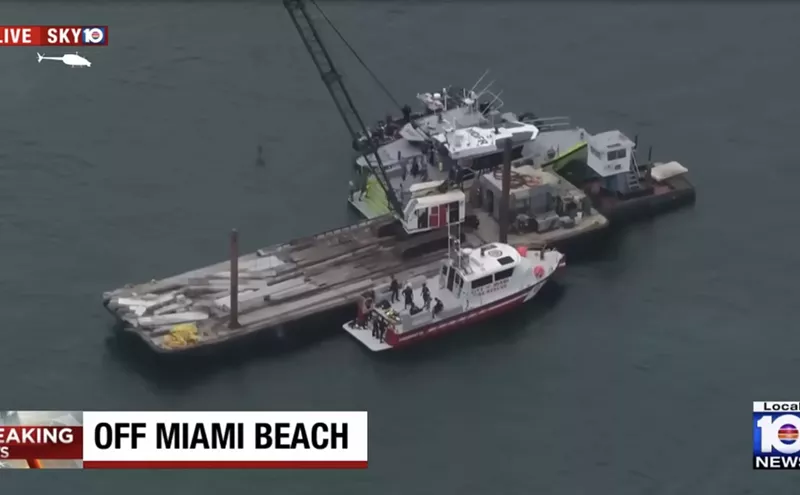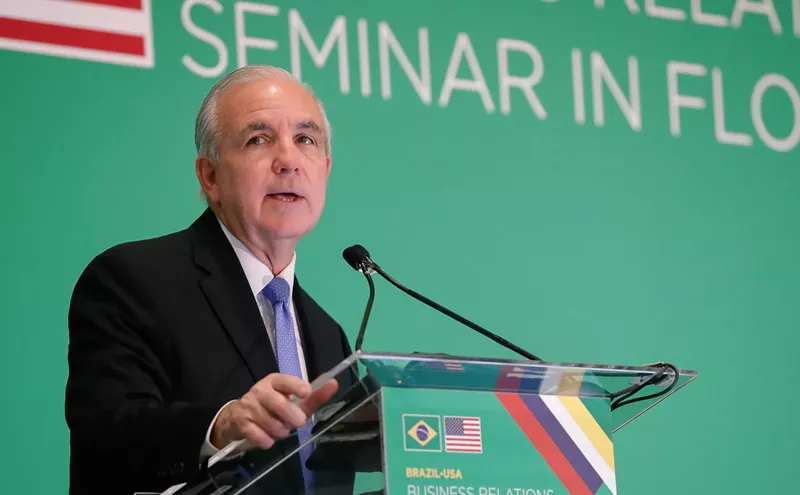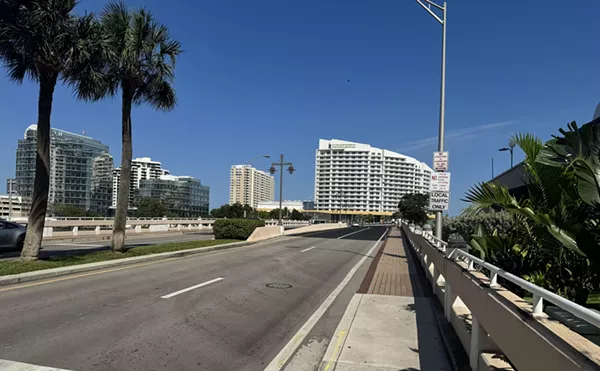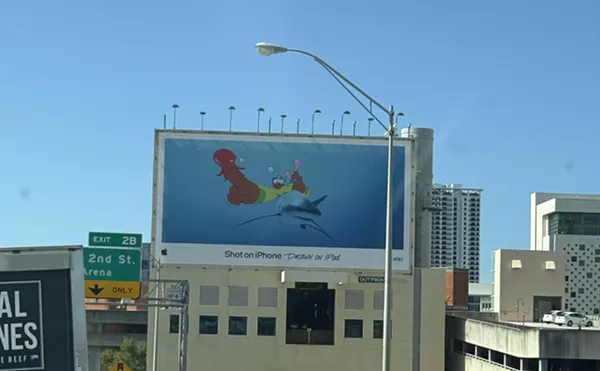Like 119 million Americans every year, Forman decided to do something about his embarrassing weight situation. The 30-year-old knew, however, that traditional girth-loss measures — gym membership, Weight Watchers, a copy of the South Beach Diet on his nightstand — weren't going to inspire him to lose weight. So, while most of obese America would cringe at the idea of exposing their jelly rolls for all to see, Forman concluded that the only way he would be able to drop pounds would be if — like the contestants on weight-loss reality show The Biggest Loser — the entire process were documented on camera.
Fatboy is an hour-long documentary that follows Miles Forman on his journey to lose weight by any and all means necessary. Miles has lived in South Florida his entire life. He used to be in a rock band and hung out with Marilyn Manson and the Spooky Kids. He was the kind of tween who would gather up neighborhood children to perform plays. He wears old, cheesy T-shirts and isn't trying to be ironic about it, and he likes to squirt Easy Cheese directly into his mouth.
Superficially, in almost every sense, Miles is your average guy. Pass him in the cereal aisle at Publix and he wouldn't stand out from the raisin bran. But go see Mamma Mia! at the Broward Center for the Performing Arts and you're sitting in a building on land owned by the Forman family. The clan — which includes Miles's grandfather, Hamilton; his two sons, Collins and Austin (Miles's father); and Miles — is a Fort Lauderdale institution, as old money as can be in Florida. His grandfather, Miles will tell you, was one of the first to take root in the area. He opened the Forman Dairy and Nursery in the Forties, helped racially integrate Broward County's first hospital — Broward General Medical Center — in the Fifties, and eventually built a real estate development empire. "When he went into the military," Miles says of his grandfather, "he was sent to California, where he saw they were building all these strip malls, all the stuff we have here now. When he saw that happening [in the late Forties], he thought, Florida isn't too far behind all of this — maybe being in the real estate market isn't such a bad idea. So he came back here and started buying up land. My family has been involved in real estate here since the Forties and in Broward County politics for a very long time. So growing up, I got, 'Oh, you're Hamilton Forman's grandson,' or 'you're Austin Forman's son' a lot. I have this miniature empire around me that one day is going to fall on my shoulders, so it is kind of scary."
When he talks about his father and grandfather, it's obvious Miles, who says he made terrible grades in high school and thus didn't even consider applying to a four-year university, is proud of his family's accomplishments and says his dad, despite the fact that he was a workaholic, was involved in his life. The two, he says, have bonded over music and go on field trips together to see bands play all over the country. "When [Guns N' Roses'] Use Your Illusion came out," Miles recalls, "he sat with me and listened to all of 'November Rain.' Lots of parents wouldn't do that. So when [Slash's band] Velvet Revolver came out, my dad was like, I wanna see Slash live. So we went to Boston, and that's what got that bug up his butt."
Not everyone appreciates the rocker side of Austin Forman, though. The "scion of Broward County's most politically active family," as he's been described by the Broward-Palm Beach New Times, has been called by the press everything from "consummate influence peddler" to "prominent parasite" and was a key player in the event that captured the award for Best Scandal in last year's New Times "Best Of" issue. Forman and his partners, with the help of district CFO Patricia Mahaney, were set to rake in $100 million of taxpayer money on the development of a medical office in the North Broward Hospital District. That is, before Mahaney was caught embezzling NBHD money.
Upholding an image has always been a necessary part of being a Forman. And Miles, at least according to his mother, never quite lived up to that image. "See, now you've hit a nerve," Miles says when asked about his relationship with food — and his mother — as a youth. "I was never good enough for my mother. In many ways she rejected me; she wanted this kid right out of the catalogue — it was like she wanted a Cabbage Patch doll. She was so adamant about my weight, so eating what I wanted was my independence. It was the one decision I got to make. It's like when your sister's dating this asshole guy and you keep telling her not to date him, and that just pushes her closer and closer to him. It's the same thing."
Miles's mother is as much a recurring theme as his man-breasts in Fatboy. In the film, she recounts the time she couldn't hug him after he'd been away for a while because she was so taken aback by his weight gain and long hair. "He looked like a flippin' ape!" she exclaims. When he does finally lose weight, he flies out to Montana to surprise her.
"My mom always wanted us to have the best. I tried carob before I tried chocolate. I ate escargots when I was six. Being an only child, I think that helped make my relationship with food much stronger, because I didn't have anyone to look up to. I made food a form of expression. I was never a binge eater, to the point where I would eat a giant box of Twinkies and then cry, but when I would come home from school, I would have a snack, and it was very important that I had that snack. Plus the fact that my dad worked so much and my mom had a busy schedule as well, they didn't want to hear me bitch when they got home, so I think they kind of gave in when it came to food."
And then Miles went to a boarding academy. It was at the Blue Ridge Preparatory School outside of Charlottesville, Virginia, where Miles, at the age of fifteen, learned of his parents' divorce. "My stepmom had thought they already told me," he recalls, "and she sent me a condolence letter, and that was actually the first I had heard about it. That really set me on a tailspin. When I came home, everything was magnified times ten — if some kid made fun of me, I'd fly off the handle. My mom had moved to our summer home in Montana, and my stepmom was almost already living in the house already. So it was difficult to have your parents wave goodbye to you at the airport and then come home ... it was very Twilight Zone. When that happened, I was completely done with any governing of food." More than a decade of rebellion-via-junk-food later, at the age of 28, five-foot eleven-inch Miles weighed about 250 pounds.
"So I called Michael [Landsberg] up and I told him the reason I want to do this film is I know if I don't, I'm going to be fat forever," Miles explains. Landsberg, who has also lived in South Florida his entire life (Coral Gables, to be exact), opened his own production studio — Capsule Media — in his father's dentistry practice. The 29-year-old pays the bills by shooting corporate commercials for companies such as Palm Pilot, DirecTV, and the Discovery Channel. Although Landsberg knew nothing about the subject of weight loss or obesity — he's weighed a buck fifty since high school — Fatboy, he says, was a way to be a part of something more creatively fulfilling than a two-minute Burger King corporate video.
"I'm always looking for something outside of advertising, because that's how we make a living, so it's a real joy to spend your days on something else," Landsberg says. The director's only stipulations: that the movie be shot on film instead of digital video, the format of choice for most of today's documentaries because it's easier to shoot, easier to edit, and a hell of a lot less expensive. His reasons for wanting to keep it old-school? "First, you can shoot six months on video and it's easy to walk away from that project if it doesn't seem like it's going to get where it's gotta go. When you're shooting film, it costs so much every second. It appeals to me in a much greater sense, though, because just the craft of working with film. It's the process. It captures the human personality — better skin tones, everything seems to be a lot brighter."
Landsberg's other condition was that Fatboy be 100 percent South Florida. Though the city seems to be the locale of choice for Hollywood to blow things up, set things on fire, and go really fast — all while looking superhot — Miami has never succeeded at providing much more than a backdrop. And when a big production does roll into town, and its A-list celebrities frolic at Prive while residents curse I-95 closures, the filmmakers bring most of their crew with them. "Miami Vice, for example," Landsberg says, "the only thing they're hiring here is hotel rooms. They even bring their own assistants. When people ask me how Miami is, I say it's the fanciest truck stop in the world. In a way, people treat it like that.... They stop, they take a shit, and then they leave."
Conversely, everything about Fatboy is homegrown: The staff, the crew, and all the health experts in the film live here; the film was edited in-house at Landsberg's studio; and all the music was done by South Florida-based musicians, including a cover of Strangelove's "I Want Candy" by Plutonium Pie, who reunited just to record music for Fatboy, as well as original scores by Jim Camacho, the Spam Allstars, Humbert, See Venus, Godbaby, Tereso, Summer Blanket, The Curious Hair, and Emily Easterly. Of course, pulling in favors from family, friends, and friends of friends was also a good way to save money.
"We had a budget," Landsberg says. "I had done a music video for a band in L.A., Joy Zipper, and I was contacting them about doing the music for the film, and they were being such pains in the asses about it — 'make me an offer' type of shit — and I was like, 'You know what, I know a lot of musicians down here,' and it's a little bit of a cliché — keep it in Miami — but you know what, when you can, I think it's really important. Pretty much all except for a few are from South Florida, and half of which recorded here live. They just played what they felt."
As interesting as Fatboy's local angle was, however, it wasn't going to make a movie about dieting and the food industry any more interesting. Landsberg knew that recording a bunch of talking-head nutritionists spitting facts about slow food trends and attempting to deconstruct the meanings behind the nutritional information on a can of Pam cooking spray would make for zero entertainment. The goal was Sundance, not PBS, so over the film stock, Landsberg injected catchy graphics and animation to explain all the textbook stuff. Gastric bypass surgery: a pair of animated scissors cutting through an animated stomach; the growing rate of diabetes in children: a comic book-style drawing of a kid holding a drumstick as he gets fatter and fatter.
"My responsibility as a director," Landsberg says, "was to make it as entertaining as possible, because we have so much information that people need to hear, but no one wants to be preached to. There are a million videos that tell you three-quarters of the facts that are in our film, but they don't get your attention. So from day one I wanted to sort of approach this thing as sort of a television show on acid. I felt that making it as entertaining as possible was important — not by guiding Miles, but with graphics. Hopefully, that way, we'll get some kids to pay attention too, not just the middle-agers who are a built-in audience for this kind of thing."
The flesh-and-blood cast of Fatboy proved to be one motley crew itself. There's Mike Manno, the personal trainer, who rocks the long, Eighties metal-hair look and gets fired up at the discovery of contraband buttered popcorn in Miles's kitchen. Think Richard Simmons meets Gene Simmons. Jeff Novick is the "fact guy" and in a Bill Nye kind of way explains why Pam cooking spray is fat-free. ("The serving size is one-third of a second of spray. Have you ever known anybody to use one-third of a second of these sprays?") Judging by his smart glasses and wily college professor delivery, one would never guess he owns copies of every Grateful Dead concert ever recorded. Oh, but he does. There's the soft-spoken colon cleanser, Nayima, who says all kinds of insightful things like, "Right now that water looks like drinking water. But you wouldn't want to drink it, because it's coming out of your rectum."
"We called like 30 places and no one would let us in with a camera, and finally this little Russian bath in the basement of a Howard Johnson's in North Miami said yes. And the woman was so incredible — I was laughing out loud while we were shooting. The drive home after that was such a rush. It's nice going out and not knowing what you're going to get," Landsberg recalls.
Although the idea of a documentary about obesity and the food industry is nothing original — Morgan Spurlock's Super Size Me, which followed the lanky director on a month-long McDonald's binge, was nominated for Best Documentary at last year's Academy Awards — it's fitting that South Florida is the setting for a story about a fat guy. Unlike, say, Wisconsin, where you can't chuck a ButterBurger ten feet without hitting a pair of man-breasts, South Florida is the home of the South Beach bod, and with such an abundance of tanning salons, plastic surgery clinics, and places to get waxed, it's a wonder there's anyone between Coral Gables and West Palm Beach who isn't dark, beautiful, and hairless.
Granted, the fact that women wear Brazilian jeans and stilettos to do their grocery shopping, and men consider Creatine a food group, promotes a somewhat distorted image of beauty, but the truth is, if you're young, single, and within ten miles of a beach, you best be able to wear a swimsuit in the middle of winter. Forman claims his goal, when he began the film, was never to become a world-class bodybuilder or a supermodel, but there's no doubt living in such an image-conscious part of the country distorts his image of beauty. "It truly does," says Forman. "I'm thankful for the time I spent in Montana [during summers] as a kid. I had a perspective at least, that it wasn't like here everywhere. But I could never imagine growing up not having been anywhere else and thinking this is how it is. I'm just happy I can go to the beach now and take my shirt off. That means more to me than how I look. Because I still don't have a great body. I'm not a volleyball player. I tell my trainer I want to look like Val Kilmer and Tom Cruise in that scene in Top Gun, where they're playing volleyball. If I could get half that, I'd be happy."
Landsberg followed Miles for a year and a half. During that time span, he tried the Atkins diet, created a "fat jar" to hold the lard he collected from his Popeil rotisserie, attempted to join a boxing club — only to get his ass kicked by a girl — and ultimately lost 50 pounds the old-fashioned way: diet, exercise, and therapy. Being the overweight only child in a wealthy family usually requires the last. And even though his family's history is only briefly mentioned in the film, earning their trust in order to do Fatboy in the first place, says Landsberg, took time.
"When you're someone of Miles's dad's stature, you don't want your family's dirt out in the open," Landsberg says about any hesitation the Forman family — members of which ended up donating money to make Fatboy — had about the film. "In the beginning they were like, 'Who is this guy? Why is he allowed in?' But I think Miles convinced them of how important this was. They're a very interesting family. They're all very different people." And though they may have their differences — most members of Miles's family are practicing Protestants, while he and his father are spiritual but don't participate in organized religion — what they all seem to have in common, besides being Democrats, is a very unpretentious, inconsequential approach to their wealth. Miles's father's office, for example, isn't particularly flashy. It's located on a non-penthouse floor of a neutral-toned stucco building in downtown Fort Lauderdale, and the only noticeably high-ticket item in it is an original portrait of Albert Einstein by Andy Warhol. Other than that, simply a wall unit with books and pictures — one of which is of Miles at about age ten, for which he has been superimposed on a mock cover of Forbes magazine — a cluttered Thomasville-style desk with gold fixtures, and two business office-issue burgundy leather couches.
And then there are the spears. His father is somewhat of an adventurer, Miles says, and adds that they recently returned from a family trip to Africa. They've been there three times, he says, and this time they went to Rwanda to see silverback gorillas. "We had to hike three miles into a rain forest; one day we had to hike down a volcanic crater on a 60-degree incline. It was unbelievable. It gives you a whole other perspective. Makes you appreciate what you do have. People in this country are always concerned with what they don't have, which is really sad. These kids in Rwanda, they make their own soccer balls out of trash bags and rubber bands, they speak three languages. I can't speak three languages, I can't make a soccer ball, and this is an eight-year-old kid. They're very thankful for what they do have; they don't get discouraged. It's amazing."
Miles also says he brought along a copy of Fatboy — which he was able to watch under the stars on his portable DVD player — and that while in Botswana, he got to meet Don Hewitt. "He's the creator of 60 Minutes," Miles says excitedly. "I'm going to send him a copy of Fatboy today."
Trips to Africa, a meeting with a media mogul, a family with clout: One of Landsberg's concerns was convincing the audience to sympathize with the fat rich kid. "We did a lot of test groups, and at one point people were like, 'Why are people rooting for him?' When you get so close to a project, you don't see the void, but when you look at a kid who comes from a wealthy family, why are you going to feel bad for this kid? What hardships has he lived through and whatever else?" explains Landsberg. "But you know what, being raised by your nanny and not having your parents right there to show them your report card when you get home from school, that can be just as bad as any other person's situation. My parents were absent parents. I don't hate them for it, but I definitely spent a lot of my childhood trying to get their attention, which I have a firm belief that Miles did as well. Hiding food, keeping that kind of control, that's a big part of it."
That and the man-breasts. "You live this contrived social life," he says of the impositions of his bosom. "I'd see a girl across the room for instance, and I might have everything she wants and all these cool things to say to her, but before I even put one foot forward, everything is destroyed because I'm so conscious of my weight. If I was invited to a pool party, I'd go in the pool with my shirt on, and when it was time to get out — and you know wet shirts cling to you — I would look around and time it so that no one was looking at me and jump out real quick, fluff my shirt out. It's ridiculous to explain this, but it's honest. Even in the car — if I pick a girl up for a date, the seatbelt defining the man-breasts, I'm just so very conscious of that. I was not exaggerating a bit about how devastating it was, and just to say that in front of you right now curdles my blood."
It is this openly and unabashedly pathetic attitude that does, in the end, make Miles a sympathetic character. Sure, he had a nanny who cooked him fried chicken while most kids never knew anything but the ten-piece bucket from KFC, but who in their life hasn't ever felt awkward or downright fugly? Besides, Miles didn't get fat because he comes from money. He got fat because he ate too much and for the wrong reasons. Because we can relate to eating, say, an entire chocolate pound cake in one sitting, we can look past the fact that not once is Miles seen at an actual job during the film (he says he owns a few properties and a landfill business).
Now about 190 pounds, Miles says he's not trying to lose any more weight (he lost more than 50 pounds during the film and 10 more after). He eats apples, works out every day, and is dating someone for the first time post-Fatboy. Life, he says, is good. "My main focus now is getting in the gym and toning. I want it all to be tight," he says as he lifts up his shirt and slaps his stomach, revealing, probably unintentionally, what's left of the man-breasts. Definitely no more than an A-cup.












